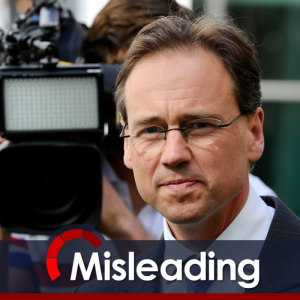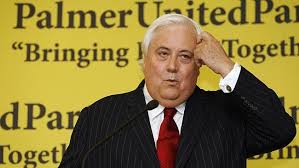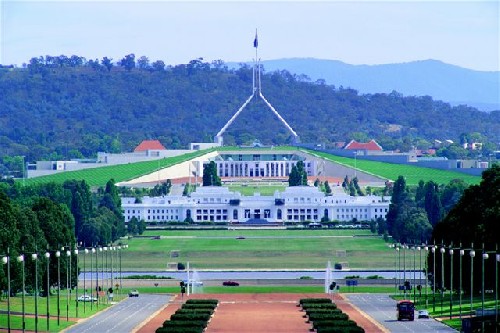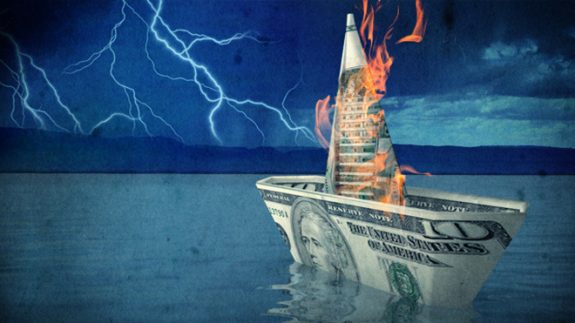Still being lied to

So it seems that Bill Shorten will be taking a proposal for a 50% renewable target by 2030 to Labor’s national conference in Melbourne this weekend. Accordingly, climate change is shaping up to be a major battleground for the next election – probably much to Abbott’s chagrin. On this argument, the Coalition starts from behind. Tony Abbott would prefer the discussion to be neutralised and as a result the government is stepping up the rhetoric to attack Labor’s history and position on the climate change front. As a result, the laughably-named Minister for the Environment, Greg Hunt, has been working the airwaves furiously to poison the national consciousness.
Shorten’s laudable goal, as those who have been watching the development of renewable energy and its increasing prevalence in the energy mix of countries and even Australian States will know, is technically not difficult. Labor describes the proposal as “ambitious”, but the main challenge with achieving this is political. The primary difficulty is that the Australian people are skeptical about the ability of renewable energy to be a practical, economical choice for energy generation, and consecutive conservative governments have sought to play up on that uncertainty at the behest of their backers and overlords, the existing fossil fuel oligarchies. The Australian people have been lied to from the outset.
They’re still being lied to now. Greg Hunt has been given saturation coverage on news media outlets, parroting the Government’s official response to the reports of this labor policy proposal. The detail of Hunt’s interviews and discussions has varied slightly from broadcast to broadcast, but the salient points remain the same. Unfortunately but predictably, the Government’s official stance – and thus Hunt’s answers – is a farrago of lies and mistruths that often pass without challenge. The ABC is not immune to this mistreatment: in several ABC news interviews Hunt has made the same baldfaced statements without being challenged. The ABC can’t be blamed for this. In an already fraught environment with the national broadcaster under continual threat, challenge and attack by our government, it is vital for the ABC to retain an appearance of impartiality for its news arm. Rather, the problem is with our laws and systems that contain absolutely no penalty for a Government Minister to lie to a reporter, and to lie to the Australian people, so long as they can get away with it. A Minister can lie with impunity – as long as their lie goes unchallenged.
This is a problem, as we head into an election year in 2016. Standard practice in news reporting is to describe the news item of the day, interview appropriate persons involved with the policy or proposal or scandal, and drill into the detail to as shallow or deep an extent as time allows. Then, in the interest of “balance”, journalism will often seek a response from the other side. In politics, this brings us to a situation where the Coalition, with the benefit of incumbency, can coast with few policy announcements, leaving Labor few opportunities to respond. Labor’s situation is more challenging. Winning back government from opposition is difficult and requires a constant stream of policy announcements. When the last word in a news report comes from a Coalition minister in response, far too often the sound bite the audience will remember is the government’s position. If that position is in error, the voters have been misled.
A news reporter is not in a position to challenge a statement made. That comes down to us – the concerned public. It is incumbent on us to be informed, and to inform others who might otherwise be taken in by the lies.
Because the Coalition adheres to the concept that repeating a lie often enough will convince people to take it as truth, their talking points in response to Labor’s proposed policy are consistent and we will hear them trotted out regularly over the coming weeks. Each one of them is demonstrably untrue and the best response progressives can make is to have ready clear, concise explanations as to why each Coalition argument is based on a falsehood. With that in mind, what follows is a precis of the Coalition’s talking points on Labor’s proposed renewable energy target and ETS.
The centrepiece of the policy will be a new carbon tax.
“Carbon tax – they’ll call it an emissions trading scheme, but it’s the same thing, with the same effect, the same hit on electricity prices…” In a recent interview, asked several times for clarification, Hunt fell back on the government’s agreed attack line: that an ETS is just a carbon tax by another name. This was not true the first time around and it is certainly not true now. The reason why is very simple.
Under a carbon tax, every emitter pays for their emissions. Every tonne of carbon carries a cost. The incentive is obvious for the business to reduce its carbon emissions and pay less tax. All taxes raised go to the government, for use in whatever way it deems appropriate. The government may choose to return some of the taxes to companies in the form of incentives and subsidies, but to do so is to devalue the impact of the tax. Over time, unless you force changes to the tax rates through parliament, the price of carbon remains the same.
In contrast, under an ETS, businesses are permitted to release carbon emissions up to a cap, without any cost to them. If a business holds sufficient carbon permits, it can emit as much carbon as it likes with no financial cost at all. If it emits less carbon than it holds permits for, it can trade the excess permits on the market, allowing other businesses more latitude to emit carbon. This brings you to the question of how the business gets the permits in the first place.
Under the Gillard government’s ETS, initial permits were allocated for free to relevant industries to shield them from the immediate impact. Other organisations were forced to purchase initial permits. Over time, under an ETS, the number of permits available is regulated to decrease, providing incentive to companies to reduce their carbon emissions over time: as time goes on, carbon permits become more expensive, increasing the benefit to the company if it can trade its excess permits on the market, and increasing the cost of permits if it does not.
Due to compromises with the Greens required to get the legislation through a hostile senate, the price of permits was set for an initial three year period and the permits were not eligible to be traded, thus making the scheme’s initital appearance close enough to a “tax” to make it unworth arguing the semantics of “tax” and “ETS”. This led, in short order, to Labor being lambasted as a high-taxing regime (ironic, coming from the party which would soon implement a much more oppressive tax regime) and Julia Gillard as a liar.
Labor has learned its lesson on this front. It is fair to assume its new ETS will not commence with a set price and untradeable permits. For the government to claim that Labor’s new ETS will be “exactly the same” as a carbon tax is misrepresentation of the highest order. The ETS will be a different thing, with a very different effect, working in a very different way.
Greg Hunt knows this very well. This is the same Greg Hunt who won an award for co-authoring a thesis about implementing an ETS in Australia. Until recently some on the left held a grudging respect for Mr Hunt, being forced to toe the party line against his own documented beliefs, and pity, for being one of the few realists in a cabinet laced with flat-earthers. His recent performances have shown that he is a thorough convert to the Coalition’s paradigm that somehow a market-based scheme is far inferior to direct governmental intervention. As a result, his respect has died, leaving him only with pity.
Regardless of his personal beliefs, however, Greg Hunt knows very well that an ETS is not remotely similar to a carbon tax, and to claim that it is is to deliberately mislead Australian voters.
A higher renewable energy target will increase electricity prices
The talking point that a renewable energy puts upwards pressure on power prices seems an article of faith for the Coalition. This also is demonstrably untrue. ETS or carbon tax aside, all experience in Australia to date disproves the idea that renewable energy competition can push the price of electricity up. All models and analysis, including the government’s own modelling, show clearly that renewable energy puts competition and downwards pressure on energy prices. The only group that this hurts is the big energy generators and distributors, who coincidentally are big benefactors of the Coalition.
An ETS did have the expected outcome of pushing up power prices from carbon-heavy power generators. Gillard’s government allowed for this and overcompensated consumers for the expected price increases.
The one thing likely to place significant upwards pressure on energy prices is the effect of Queensland’s previous, liberal government opening its gas markets to export. The result is that gas, one of the major energy sources for much of Australia’s eastern seaboard, will now be traded at the significantly higher international price rather than the domestic one.
The carbon tax “didn’t work”
Perhaps the most egregious lie of all is the continued insistence by the Government and Greg Hunt as their mouthpiece that the carbon tax was ineffective. It has been claimed that during the carbon price, emissions continued to increase. This is true. What is wilfully ignored in that discussion is that, under the influence of the carbon price, emissions rose less than they would have otherwise done. In fact, the carbon price was restricted to a relatively small part of Australia’s economy. In sectors where the carbon price applied, carbon emissions decreased markedly. (And, unsurprisingly, upon the repeal of the carbon price, carbon emissions in these sectors immediately increased again). Hunt has argued that Australia’s carbon emissions were already falling prior to the introduction of the carbon price and that the ETS had little effect. This also is untrue. In short, the government’s overblown claims about the carbon tax are almost universally deliberately misleading or even entirely untrue. The carbon price, even at a high price per tonne and acting like a tax, had little effect on the overall economy, destroyed no country towns, and was being remarkably successful at reducing Australia’s emissions.
A new ETS could do the same again.
Labor is inconsistent
Greg Hunt foamed that the parliament had “…just voted for stability in the renewable energy sector…”, referring to the recent passing through the parliament of a reduced renewable energy target for Australia. This criticism popped its head up but has now subsided; perhaps the Coalition has decided that talking about “the politics” is a little too fraught to be a certain winner. In any case, the fact that Labor reluctantly supported the government’s cut of the renewable energy target to 33,000 GW does not mean that Labor is inconsistent. Labor was able to forge a compromise position for the sake of settling the argument in the short term and giving certainty to the existing renewable energy market, but it was clear that this figure was not Labor’s preference.
Frankly, it seems amazing that Labor was able to secure any kind of a compromise from this government, after more than a year of the government steadfastly refusing to budge from its original position. As this government has shown, any policy agreed to under one government is not sacrosanct to the next.
The truth shall set you free
Armed with the facts, it becomes easier to counter the government’s wilful misinformation. Not easy, of course: there are none so blind as those who will not see, and for many in the Australian public the prevailing narrative being told by the government is emotionally compelling. But there are some who may be persuaded by actual facts and evidence. It is for these people that we must be prepared to call it out when we see the government deliberately distorting history and building straw men on Labor’s commitments. We must be able to point out that they have been lied to, and they are still being lied to.
Like what we do at The AIMN?
You’ll like it even more knowing that your donation will help us to keep up the good fight.
Chuck in a few bucks and see just how far it goes!
Your contribution to help with the running costs of this site will be gratefully accepted.
You can donate through PayPal or credit card via the button below, or donate via bank transfer: BSB: 062500; A/c no: 10495969













